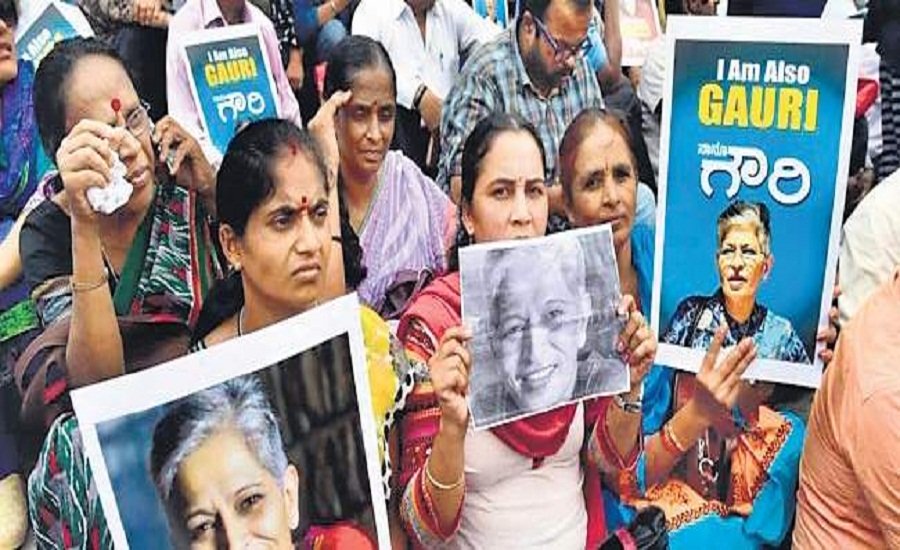
Gauri’s watershed assassination comes at a particularly dark period in the history of Indian democracy — a time when the political arm of the State seems to close in on freedoms of every sort in order to obviate threats from the ground to the unprecedented centralization of economic power.
BADRI RAINA | Caravan Daily
TO STATE the obvious first, in any democratic country, the “media” is never a monolith. Its spread and diversity is inevitably informed and propelled by diverse perceptions about what the State ought to be doing, and how civil society, of which the media is perhaps the most influential part, ought to formulate opinion conducive to the desired objectives of State policy.
I therefore speak of Gauri Lankesh both as a public intellectual and an icon for a section of the media.
Gauri Lankesh’s murder thus betokens an attempted triple-assasination, namely of an inconvenient individual, civil society icon, and theorist of an alternate State.
After the quite epochal determination by a nine-judge Constitution Bench of the Supreme Court of India that the privacy of the citizen constitutes a Fundamental right, deriving from Article 21 which enshrines the Right to Life with Dignity, sections of India’s civil society which includes the present writer began to feel encouraged to envisage a day when our Legislature at the center might venture to put India’s political democracy on the same irreversible footing as that of the United States of America by giving the country our own Absolute First Amendment Right, with the present “reasonable restrictions” restricted, in turn, exclusively to cases where incitement to violence or actual violence is proved. One cannot but think that the murder of Lankesh has also been an expression of the animus felt by sections of civil society at the rebuke handed out by the Supreme Court to governmental efforts at doing the opposite of what the American First Amendment does — make the State loom menacingly large over the citizen.
Yet, the anguished churning that has followed in the wake of the cowardly physical extermination of Gauri Lankesh may well become occasion precisely to further India’s Constitutional democracy towards a First Amendment of our own. Here is the crude irony: there is no dearth of admirers among India’s chattering classes of what media outlets such as CNN and NBC have been doing to the Trump Presidency. But the very same subjects would be up-in-arms at the thought that our own Media should have similar freedom to take on the powers-that-be. The vulgar chagrin with which they denounce such a course is of course most offensively, even menacingly, apparent in the content of so much anti-social “social media.” That the Prime Minister of India follows some of these braves seems a matter of no concern.
Gauri’s watershed assassination comes at a particularly dark period in the history of Indian democracy — a time when the political arm of the State seems to close in on freedoms of every sort in order to obviate threats from the ground to the unprecedented centralization of economic power. What might have been a fringe among Indians until some years ago, seeking to concertedly homogenize the polity into one undifferentiated obliging and obedient mass of “nationalists” is today “mainstream” and in close embrace with the agencies of the State. There is no end of the chagrin felt by this “mainstream” at the spokes often put by the judiciary into this project of leveling citizens into sloganeering automatons, but the judiciary for now is there and may not be eliminated. Clearly, however, icons from the media world who think like the judiciary on issues of Rights may be. And the government at the highest level may refrain from tweeting a single word of condemnation, indicating the reluctance of the State to thwart the “nationalist” intent and exertions of “right-thinking” people among the populace.
It remains to be seen whether or not the accreted habits of democratic living and of allegiance to a Constitutional political and legal regime among India’s voters at large will in the days to come join the fight against a sectarian-authoritarian bent in the dispensation that now operates the procedures of the State and of the murderous crop of vigilantes who have mushroomed, not unaccountably, to aid that bent.
Most significantly, those sections of the media who are today, say so or not, aligned not-too-subtly with these authoritarian forces will need to reflect beyond the meaty interests of their corporate owners. For them, especially, the murder of Gauri Lankesh ought to be decisive indication of what powers they are serving. Ambedkar’s resonant caution comes to mind: whereas a bakhti cult is understandable in religious life, in politics this can be a recipe for the ultimate collapse of an accountable State. Something that Nehru understood all too well, as he took every occasion to remind the media, including cartoonists, never to spare him since he could have the proclivities of a dictator.
Now, as a brave Member of Parliament of the ruling Bharatiya Janata Party, Nana Patole has publicly stated (The Indian Express, September 2), “Modi does not like being asked questions.” Those who killed Gauri Lankesh belong precisely to this frame of mind — do not ask questions. Only shower praise, even if wholly unwarranted.
Has Gauri Lankesh in her martyrdom propelled India to rethink and rebuild democracy?

